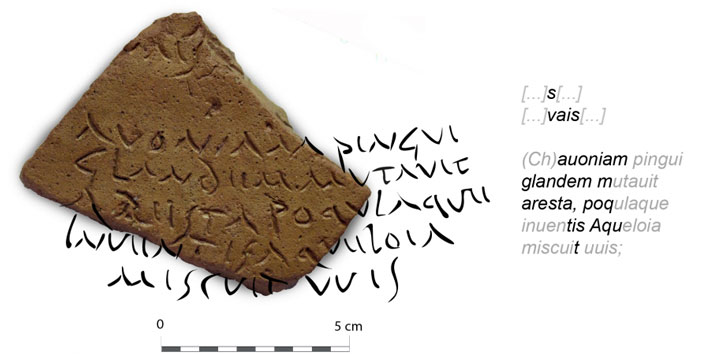 HORNACHUELOS, SPAIN—The Guardian reports that a fragment of a text written by the poet Virgil has been identified on an 1,800-year-old piece of a Roman olive oil amphora unearthed in southern Spain several years ago. “We thought it might be something quite exceptional because you hardly ever get more than a line or two of engravings on an amphora,” said archaeologist Iván González Tobar. “This one had four or five lines. While we didn’t understand it, we thought it was quite special.” Spelling mistakes slowed down the identification of the source of the Latin as the first section of Virgil’s Georgics: “[Earth] once changed the/Chaonian acorn for the plump wheat-ear/And mingled with the grape [your newfound gift].” González Tobar explained that texts from Virgil have been found on bricks, which may have been used for teaching pupils before they were used for building. This piece, however, came from the lower part of an amphora, and would not have been readily visible. “Maybe a worker there wanted to show them to a colleague—they could have been done by an adult or a child. What we do know is that this was done inside an amphora factory, and that the lines were probably written from memory,” González Tobar concluded. To read about a popular Greek poem that was etched on walls and artifacts throughout the Roman Empire, go to "Poetic License."
HORNACHUELOS, SPAIN—The Guardian reports that a fragment of a text written by the poet Virgil has been identified on an 1,800-year-old piece of a Roman olive oil amphora unearthed in southern Spain several years ago. “We thought it might be something quite exceptional because you hardly ever get more than a line or two of engravings on an amphora,” said archaeologist Iván González Tobar. “This one had four or five lines. While we didn’t understand it, we thought it was quite special.” Spelling mistakes slowed down the identification of the source of the Latin as the first section of Virgil’s Georgics: “[Earth] once changed the/Chaonian acorn for the plump wheat-ear/And mingled with the grape [your newfound gift].” González Tobar explained that texts from Virgil have been found on bricks, which may have been used for teaching pupils before they were used for building. This piece, however, came from the lower part of an amphora, and would not have been readily visible. “Maybe a worker there wanted to show them to a colleague—they could have been done by an adult or a child. What we do know is that this was done inside an amphora factory, and that the lines were probably written from memory,” González Tobar concluded. To read about a popular Greek poem that was etched on walls and artifacts throughout the Roman Empire, go to "Poetic License."
Roman Poetry Found on Amphora Fragment in Spain
